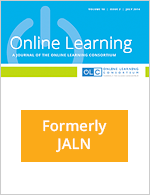Volume 14, Issue 4 - December 2010
Educational Transformation through Online Learning: To Be or Not to Be
The purpose of this article is to examine online learning at the macro level in terms of its impact on American K-12 and higher education. The authors draw on six years of data that they have collected through national studies of online learning in American education as well as related...
A Quality Scorecard for the Administration of Online Education Programs: A Delphi Study
As the demands for public accountability increase for the higher education, institutions are seeking methods for continuous improvement in order to demonstrate quality within programs and processes, including those provided through online education. A six round Delphi study was undertaken with 43 seasoned administrators of online education programs who agreed...
Mentoring for Innovation: Key Factors Affecting Participant Satisfaction in the Process of Collaborative Knowledge Construction in Teacher Training
This paper presents data about the successful use of the Mentored Innovation Model for professional development for a group of Hungarian teachers (n=23, n=20 in two iterations), which was employed in the CALIBRATE project in order to enhance their ICT skills and pedagogical competences needed for participation in a multicultural,...
Faculty Actions that Result in Student Satisfaction in Online Courses
This study identified faculty actions which positively influenced student satisfaction in the online classroom at the community college level. The escalating demand for Internet-based, distance education courses has been met by an increased inventory of them. However, while online education has been in existence for over a decade, standardized practices in...
Automating Expertise in Collaborative Learning Environments
We have developed a set of tools for improving online collaborative learning including an automated expert that monitors and moderates discussions, and additional tools to evaluate contributions, semantically search all posted comments, access a library of hundreds of digital books and provide reports to instructors. The technology behind these tools is...

